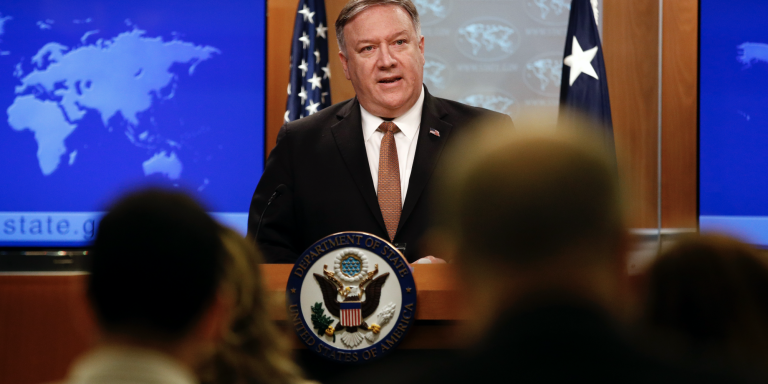INTELBRIEF
April 9, 2019
IntelBrief: Iran’s Revolutionary Guard Corps Named Terrorist Group

- The 8 April Trump administration announcement designating Iran’s Islamic Revolutionary Guard Corps (IRGC) as a Foreign Terrorist Organization will have little practical effect on IRGC operations.
- There are few benefits to the designation because the IRGC is already widely sanctioned; few foreign companies transact any business with it.
- The Pentagon opposed the designation due to the potential for Iranian retaliation and for other countries to declare elements of the U.S. military as a terrorist organization.
- The designation was the first time a duly-constituted military of a foreign country was named a terrorist organization and appears to contradict the intent of the FTO designation law.
.
On April 8, 2019, the Trump Administration announced its intent to designate Iran’s Islamic Revolutionary Guard Corps (IRGC) as a Foreign Terrorist Organization (FTO), a designation that will take effect by April 15 unless Congress acts to block the move. Such congressional action is unlikely because of the bipartisan consensus that Iran is an adversary of the United States that needs to be countered aggressively. Secretary of State Mike Pompeo justified the designation as a response to the IRGC’s involvement in several acts of terrorism, including the October 1983 bombing of the U.S. Marine barracks in Beirut, the 1996 bombing of the Khobar Towers housing complex in eastern Saudi Arabia, and an alleged plot in 2012 to assassinate the Saudi ambassador to the United States. Last week, the top State Department official for Iranian issues said the department had concluded that Iran-backed elements in Iraq were responsible for the deaths of 608 U.S. military personnel during Operation Iraqi Freedom during 2003-11. President Trump and other U.S. officials described the action as an integral next step in the administration’s campaign to apply ‘maximum pressure’ on Iran’s economy and on Iranian institutions responsible for Iran’s activities outside its borders. In his announcement, President Trump stated: ‘If you are doing business with the IRGC, you will be bankrolling terrorism.’
Yet, many in Congress, the Pentagon, and the U.S. intelligence community reportedly opposed the designation as contrary to the intent of the 1996 law that established the FTO designation process. The law has always been interpreted to apply to non-state actors –not duly-constituted military organizations of a foreign country, like the IRGC. Opponents of the designation assert that the move could cause adversary countries to declare the U.S. military as a terrorist organization, a step Tehran took mere hours after the U.S. announcement. The designation could also provoke Iran to directly, or through its allies and proxies, attack U.S. forces in countries such as Iraq or Syria where U.S. forces operate in proximity to the IRGC’s Qods Force or to forces backed by Iran. Pro-Iranian Shia militias recently launched rockets on the U.S. consulate in Basra, Iraq, as well as in the secure Green Zone where the Baghdad government is seated. Similar attacks are possible if Iran decides to implement its threat to retaliate for the IRGC FTO designation.
Critics of the designation also argue that declaring the IRGC as an FTO will have no practical effect on its operations or capabilities. The IRGC has already been sanctioned under several U.S. executive orders and laws that have caused foreign companies and governments to transact no direct business with it. The IRGC is funded by the Iranian national budget and purchases its equipment through the Ministry of Defense and Armed Forces Logistics, insulating the IRGC to some extent from further international sanctions. The United States has designated for sanctions hundreds of entities that are affiliated with the IRGC, and these affiliates are already primarily shut out of the global economy.
The relative absence of apparent benefits of the designation raises questions as to why the Administration decided to implement this step. Some assessed the move, which was long debated within the administration, as an effort to bolster Israeli Prime Minister Benjamin Netanyahu’s chances in the Israeli national elections on 9 April. The Prime Minister has frequently described Iran as Israel’s main regional adversary while touting his own close ties to Washington and in particular the Trump administration. The designation could also represent an effort by President Trump to demonstrate that he is taking concrete action against the threat posed by Iran, as he faces his own re-election battle in 2020. Still, the widespread consensus is that the FTO designation will have no material effect on the IRGC’s activities. More ominously, it undermines the Trump administration’s credibility on the Iran issue and likely makes it more difficult for future U.S. administrations to ever revive the Iran nuclear deal.
.
For tailored research and analysis, please contact: info@thesoufancenter.org
[video width="960" height="540" mp4="https://thesoufancenter.org/wp-content/uploads/2019/04/IB-0409.mp4" poster="https://thesoufancenter.org/wp-content/uploads/2019/04/Screen-Shot-2019-04-09-at-03.51.29-1-e1554771319944.png"][/video]